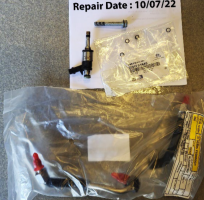
—
Hyundai argues a fuel injector class action lawsuit should be stayed (paused) and all the claims sent to arbitration.
According to Hyundai, the fuel injector lawsuit should not even be in court because twice in 2021 and again in 2023 and 2024, the vehicle owners who sued allegedly agreed to arbitrate all claims about their Hyundai vehicles.
The lawsuit includes these models.
- 2021–2023 Hyundai Santa Fe
- 2021–2023 Hyundai Sonata
- 2021–2023 Hyundai Tucson
- 2021–2023 Hyundai Santa Cruz
Hyundai Fuel Injector Class Action Lawsuit
The vehicles are equipped with 2.5-liter Smartstream GDI MPI engines that contain fuel injectors that allegedly leak. This causes the vehicles to misfire, lose power and stall while driving.
Hyundai drivers have complained about leaking fuel injectors that cost them nearly $1,000 to replace, sometimes after repeated trips to Hyundai dealerships. The plaintiffs who filed the class action contend failed fuel injectors are a serious safety hazard and Hyundai should recall the vehicles to repair them for free.
Without that, the 2.5-liter Smartstream engines may fail at any time.
According to the class action, Hyundai knew about the supposedly defective fuel injectors before the vehicles were first sold, but the automaker decided to conceal and cover-up the problems from consumers.
And the lawsuit references a technical service bulletin (23-FL-002H-1) that was issued to dealerships about fuel injector leaks. That bulletin specifically mentions 2.5L GDI engines that can misfire because of leaking fuel injectors.
Hyundai Fuel Injector Lawsuit — Motion to Compel Arbitration
Hyundai argues the plaintiffs agreed to arbitrate their claims, and not through a fuel injector class action lawsuit.
The plaintiffs allegedly “voluntarily executed Connected Services Agreements that explicitly required them to arbitrate all of their claims arising out of and relating to their vehicle against Hyundai Motor America.”
By bringing the fuel injector class action into court, Hyundai argues the plaintiffs are attempting to evade the arbitration process to which they agreed. The automaker says the agreement is completely valid and enforceable and the judge should require the plaintiffs to “individually arbitrate their claims regarding an alleged defect in their vehicles.”
In fact, Hyundai asserts the plaintiffs agreed everything should be left up to an arbitrator.
“All issues are for the arbitrator to decide, including the scope and enforceability of this arbitration provision as well as the Agreement’s other terms and conditions, and the arbitrator shall have exclusive authority to resolve any such dispute relating to the scope and enforceability of this arbitration provision or any other term of this Agreement.” — Hyundai’s arbitration agreement
The automaker argues the arbitration clause was not hidden, contrary to what the plaintiffs want the judge to believe. And even if the “plaintiffs alleged they did not read it—they do not—a failure to read it is not grounds for it to be struck down.”
According to Hyundai, the arbitration agreement is clear and covers all the claims in the fuel injector class action lawsuit.
“This Court should compel arbitration and stay this case pending its resolution.” — Hyundai
The Hyundai fuel injector class action lawsuit was filed in the U.S. District Court for the Central District of California: Paul Richard Nunn, et al., v. Hyundai Motor America.
The plaintiffs are represented by Lemberg Law.

